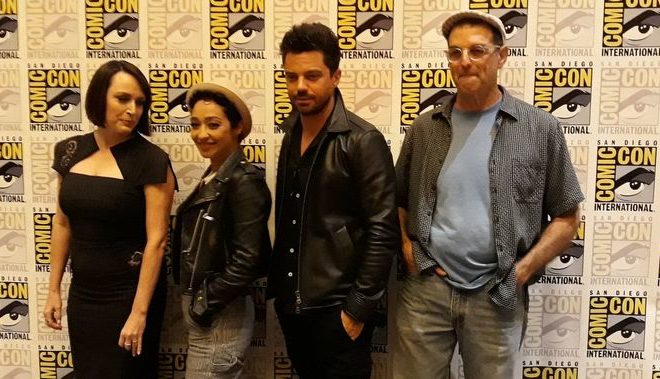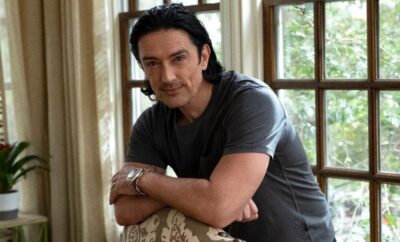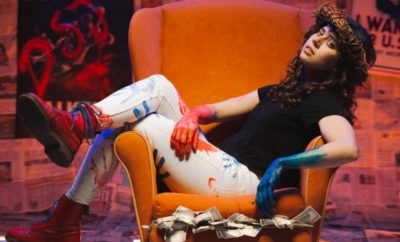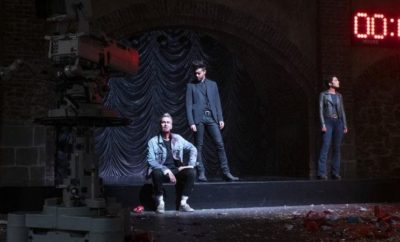
Interviews
Preacher – SDCC 2019
By: Heather Tollis
Q) What was your reaction to hearing they were going to wrap this up and finding a way to wrap the characters up?
Dominic: I think that their decision was made because they felt this story needed to, as the comics do, to have a beginning, a middle and an end and to wrap it up. And I think that’s what the fans…Because the comic book has such a definitive ending and I think that without the knowledge of that, you don’t know where it could go. It could just carry on and on. We’ve only sort of touched…
Ruth: Yeah, but you don’t want me to go, “Oh my God. Find God already.” You don’t want to bore people.
Dominic: And that become our main concern. That was the story that they chose. That was the bit that the main purpose of our story, wasn’t it? That’s what they decided when they were creating this, this particular show. And I think that they did what the people who loved those comic books originally in the 90s with ones, but it was very sad getting the news and we love doing it.
Mark: The story of Preacher was before we went into production. It was already established for the most part. So, it wasn’t creating the story and it was creating the moments that made the story that was really stimulating for us. And that’s the thing that we have…The thing that we found while we were there. But during the fourth season, the tension, the stakes just ratcheted up more, more and more and more and more. And being able to bring that to a conclusion is really satisfying as well planned. God has a vocabulary.
[audience laughter]
Q) Talk about how the landscape plays a role in the series.
Dominic: It’s always been I think a massive part of…Even I think back looking back over the comics again, the landscape was a huge part of it. The graphic novel, how it was drawn and the influence it had on the characters and where those characters were from was a huge part. And I think that they decided not only that the landscape and the beauty of the Australian outback would be necessary and make it, feel it, the vastness and the cinematic feel that Preacher deserved after this amount of time. And we found a landscape which had both an urban effect to it and the rural and I think also there’s no way like, and, but Albuquerque was beautiful at night as well in terms of the light and the landscape of this was particularly different, but I think it was hard. We got very used to it. The crew we’d worked with for a long time in New Orleans, who are wonderful understanding. We really got to know and understand that, what they did to make such a show in such a short space of time. And I think that was the adapting to that and being so far away from everything. It was also hard when you have a relationship, writers’ room, when you need artists quite quickly in us that we own a different timeline.
Ruth: But I think it’s different days.
Dominic: Yeah. Yeah. We were day ahead. Um, but I think it’s going to really add texture and nuance to the piece. That’s a bit, yeah. I didn’t see any of that was that bit built outside. It was incredible what they built. And the studios, they were magnificent and, really, we always forget this. I feel really embarrassed actually because we’re just in our zone of learning, as you do. But you suddenly step inside one of these sets and the work, the elaborate work that’s gone into them where in [inaudible] for this a lot of this season and they’re built this wonderful piece that’s built within the rocks and intricate details.
Julie: It was epic.
Dominic: They built a tank for one day’s filming. So, we should normally use in the whole of this a fill. Yeah, definitely in front of a film. No expense was spared. And I think at the moment they knew that it was going to be the last, I think both in terms of the vision and how the extremes they went to both in terms of the comic and how grotesque it became and how elaborate and how extreme. I think that they dared to go possibly as far as they could and they never really did that. They built the Alamo for a one-day shoot. Incredible.
Q) Talk about Tulip denying God’s request.
Mark: Without getting terribly specific, I can say that God is, uh, manipulating everybody. He’s manipulating everybody for his own purposes because he wants them to either succeed in what they’re doing or think that they’re going to succeed and will fail at what they’re doing. What you will allow something else to happen. He’s created this spider web and as the episodes go by of the fourth season, you’ll see the effect of this spider web. And, uh, God has very specific intentions with two of them, but they’re all wrapped up in his knowledge of her nature. And this is referred to in season three as well, this in season four that he keeps calling her on her nature. And so he sort of knows what she’s going to do in response to his request. The wild card and this is free will. And uh, even God can’t control free will.
Q) What song do you think represents your character?
Mark: God’s favorite composer was Ornette Coleman without necessarily a melodic line that you have to pledge allegiance to freeform jazz. Okay. I’m done.
Dominic: When I saw Preacher I thought it was used in the first, in the pilot, actually this image of…When at first the character walking up to the church and the first goes back to his father’s church and they played over that. Who was it again? Amongst my brain gone dead.
Mark: I liked the music question because music is a character as a series, as a character.
Q) Each one of you had such an intriguing journey together and separately each one of your characters. What do you think was the hardest thing for your character to overcome?
Dominic: I can just see finally with the help of God realizes that his pain following something that has no end and his guilt about his father and just the blame on himself. He released it at last and he has a huge disappointment in what he discovers after this quest that’s gone on for so long. But, in fact, it finally makes him happy. We finally see a man content with who he is and where his life ends and what he’s become having been traumatized and found the great difficult to exist as he is living in the guilt that he feels for the death of his father.
Q) What are you going to miss most about the show?
Dominic: Each other probably. I think the thing that we will miss and the thing that we will notice as we go forward and get new jobs is that this job offers us, as actors, such a complex and different amounts of what we do for a living in all in the space, in a short space of time. You can possibly in one day and the speed with which we filmed the show, which is quite incredible what is it of what they achieved, the crew and everyone else. But where you can start a date by doing broad comedy and it being very fun and spend the day so fits of laughter that you can then have a very, very seriously for things I was just talking about with my father or talking about the father or scenes I had with God and then you could go into doing that in a really dramatic excellently composed by sequence and that you only get one of the kind of a hint of one of those things in, in most jobs, in the fact that we’ve been blessed to do, to get all of those in the space of a day in an in a season and for four seasons. I think that that would be, I’d be hard pressed to find something and that could offer that much to us and.
Q) Talk about filming the final season.
Dominic: It’s just unreal. This was the thing that I found so special. This work that was incredible. What the writers did manage to do was they had, they suddenly knew it was ending I suppose just before the end of the third, but they introduced a lot of new characters already and then they did introduce more. They have a lot to wrap up and I think that must be very hard. You must get halfway through, you must be easy to begin. Then, you’ve got to work out how to wrap up each person’s storyline and it certainly felt the season, I think more spread out in terms of… I didn’t see you really ever. [looks at Julie]
Julie: Everything’s just hardcore.
Mark: Anybody who watches the two-episode premiere on the fourth will have been injected with some highly addictive substance. And I’m sorry.
Dominic: Well, Mark spent the day licking my eyeball. What does that mean?
Mark: It’s one of the things that makes working with a good group of people. Very important because you lose a lot of your personal life. And so while everyone…We’re all, all 150 people around the same soundstage together. It needs to be peaceful and cohesive and supportive environment. And, uh, we were blessed to have that.
Donminic: It must be horrifying, but it happens a lot. But when people are working with people that are like…You have to be so generous when you’re doing this kind of work and you have scenes to do in such a tight space of time. You need the support of someone so much in all those scenes and there hasn’t been anyone just sort of ego and that means the people who talk, the creative, the people who decide that he’s playing these characters, none of the people they want in this show. And it’s been so important.
Mark: If you’re watching something film or TV and there are two or three actors in the scenes that don’t like each other, you pretty much know it. You can tell and when they do you can see that, too. And you want to see that. Just get that.





You must be logged in to post a comment Login